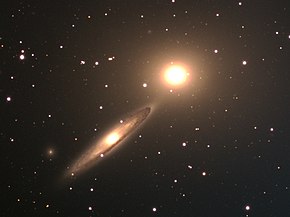| NGC 5090 and NGC 5091 | |
|---|---|
 NGC 5091 (left) and NGC 5090 (right) NGC 5091 (left) and NGC 5090 (right) | |
| Observation data (J2000 epoch) | |
| Constellation | Centaurus |
| Right ascension | 5090: 13 21 12.8 5091: 13 21 17.7 |
| Declination | 5090: −43° 42′ 16.4″ 5091: −43° 43′ 10.8″ |
| Redshift | 5090: 0.01141±0.00007 5091: 0.01177±0.00048 |
| Heliocentric radial velocity | 5090: 3,420.93±20.98 5091: 3,528.86±145.10 |
| Distance | 5090: 50.37 ± 3.55 Mpc (164.3 ± 11.6 Mly) 5091: 51.85 ± 4.15 Mpc (169.1 ± 13.5 Mly) |
| Apparent magnitude (V) | 5090: 11.51 5091: 13.35 |
| Apparent magnitude (B) | 5090: 12.59 5091: 13.94 |
| Absolute magnitude (V) | 5090: −24.8 5091: −21.0 |
| Characteristics | |
| Type | 5090: E2 5091: Sb pec sp |
| Apparent size (V) | 5090: 2′.9 × 2′.4 5091: 1′.8 × 0′.5 |
| Notable features | Interacting galaxies |
| Other designations | |
| PGC 46618 / 46626, ESO 270-2 / 270-4, LEDA 46618 / 46626, 2MASX J13211286-4342168 / J13211859-4343244 | |
| References: | |
NGC 5090 and NGC 5091 are a set of galaxies approximately 160 million light-years (50 million parsecs) away in the constellation Centaurus. They are in the process of colliding and merging with some evidence of tidal disruption of NGC 5091.
NGC 5090 is an elliptical galaxy while NGC 5091 is a barred spiral galaxy. The radial velocity of the nucleus of NGC 5090 has been measured at 3,185 km/s (1,979 mi/s), while NGC 5091 has a radial velocity of 3,429 km/s (2,131 mi/s). NGC 5090 is associated with the strong, double radio source PKS 1318-43.
One supernova has been observed in NGC 5090: SN 1981C (type unknown, mag. 14.5) was discovered by José Maza on 2 March 1981.
See also
References
- ^ "Results for object NGC 5090". NASA/IPAC Extragalactic Database. Retrieved 9 March 2019.
"Results for object NGC 5091". NASA/IPAC Extragalactic Database. Retrieved 9 March 2019. - ^ "Galaxy pair NGC 5090 and NGC 5091". European Southern Observatory. 30 April 1999. Retrieved 9 March 2019.
- Maza, J. (1981). "Supernova in NGC 5090". International Astronomical Union Circular (3581): 1. Bibcode:1981IAUC.3581....1M.
- "SN 1981C". Transient Name Server. IAU. Retrieved 4 December 2024.
External links
- "Of Holes in the Sky and Pretty Galaxies" by the European Southern Observatory
- NASA Astronomy Picture of the Day: Seeing Through Galaxies (5 December 1997)
- NGC 5090 and NGC 5091 on WikiSky: DSS2, SDSS, GALEX, IRAS, Hydrogen α, X-Ray, Astrophoto, Sky Map, Articles and images
This elliptical galaxy article is a stub. You can help Misplaced Pages by expanding it. |